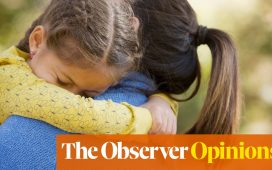“As soon as the [coronavirus] crisis hit, we realised that this basic human need to connect with people we cared about was likely to be affected by restrictions,” says Lisa Harker, director of the Nuffield Family Justice Observatory, which aims to improve the evidence for decision-making in the family justice system.
“The abrupt halt to face-to-face time with their families overnight will have had an immense psychological impact on vulnerable children,” she adds.
Face-to-face contact between children in care and their families was the first thing to stop after lockdown, as well as final contact sessions between birth parents and young children about to be adopted. As family courts were closed, almost all cases were heard remotely, raising concerns that legal proceedings to take at-risk children into care would not be robust or fair.
With the whole system thrown into a state of barely controlled chaos, the president of the family division, Sir Andrew McFarlane, asked the observatory to conduct a rapid review of how all court users were experiencing family hearings held “virtually” from the confines of their homes during lockdown. He wanted to ensure that only suitable cases would have to go ahead remotely.
“The family justice system has never had any feedback – it’s like a surgeon never finding out how the operation went,” says Harker. Thousands of life-changing decisions are being made day in, day out by family judges with no idea whether they have led to an even halfway decent outcome for children, or if disaster has been the eventual result, she adds. It’s a pretty devastating charge – but a concern that family judges themselves have also expressed.
Harker’s team surveyed more than 1,000 judges, lawyers, parents, social workers and other family court users. The report, published in early May, uncovered “some really eye-watering examples”, says Harker, of cases heard in the early days of the crisis “that many felt should never have been conducted in the way they were”.
One mother, for example, said she “had to give her evidence from her garden shed, because she could find nowhere else where her children couldn’t hear her,” Harker points out. Another woman, still in hospital after giving birth, had to attend a remote court hearing at which the local authority was applying to remove her newborn child. “She was in a side room, without legal representation,” says Harker bleakly. “She missed hearing the outcome [that the newborn be taken into care] and had to be told later.”
There is “a strong consensus” from the findings of the report that when judges are asked to make drastic orders, which might end up with a child being taken permanently into care, or placed for adoption, or any situation where evidence was contested and cross-examination of witnesses would need to be done, that virtual hearings are “not justice, and not a humane approach that professionals want to take, she says.
Harker is particularly concerned about “situations when an infant may ultimately be removed from a parent’s care on a permanent basis”. With no contact, a mother cannot say at a final hearing that she has bonded with her baby – and one of her strongest arguments for retaining the care of her child is suddenly gone.
The report highlighted that in the initial rush to remote hearings, technical unpreparedness had caused parents and professionals huge stress. But court users generally felt that for uncontested matters, or case management hearings – where judges and parties discuss how the main hearing will be conducted – remote courts can, in principle, operate fairly. Urgent applications for removal of children relating to immediate safeguarding concerns, while far from ideal, would also, it was felt, need to go ahead. In April there were 1,374 applications to take children into care in England, slightly down on the same month in 2019 and 2018.
There are currently more than 78,000 children in state care, living in residential care homes or with foster carers. Harker says some of her fears about those children’s lack of physical contact time with birth families during lockdown have been somewhat eased. “With lockdown and contact centres closed, and complete chaos as professionals scrabbled around, our initial concern was that contact would stop completely,” she says. “So what was encouraging was that our research shows there have been attempts to keep children in touch with their families though digital means.”
And for teenagers, she points out, digital contact can be more natural and normal. “Some social workers and foster carers have [perhaps] been too reticent about digital contact. That’s not saying it should replace face-to-face [meetings], but children go through phases, and there is maybe something about the ease and the less intense sense of checking in on a more regular basis.”
However, Harker believes there needs to be an “urgent focus” in government and among child protection professionals on the negative impact of lockdown on younger children and infants. “It needs to be a national conversation because digital contact for very young children – and particularly for babies – is not meaningful in any sense. So we have to think about balancing the health risks against the psychological risks for children who are not living with their families. How can we be more creative in managing socially distanced contact? And we need to give really urgent thought to ‘Is physical contact possible?’”
For Harker, improving the child protection and family justice system at all times is deeply personal. “I’m an adoptive mum. That’s opened my eyes to the lifelong impact of a child being removed from a family,” she says.
The former child poverty tsar under Tony Blair’s Labour government, who subsequently worked on children’s rights for charities and policy organisations, is the first director of the Nuffield Family Justice Observatory, which was set up just a year ago.
Harker acknowledges that parents, children and their wider family who end up in the family justice system often feel as traumatised by the process they experience as they do about the final decision.
The desire legal and social work professionals have to work in a humane way to deliver justice, she says, “isn’t always apparent to the children and families that experience the system first hand – and it’s not much apparent to anyone outside the family justice system either, because it all operates so much in the dark”.
But she adds: “It’s a system full of people whose primary concern is for children and families. And we need to hold on to that.”
Curriculum vitae
Age: 51
Lives: Oxford
Family Married, two children
Education: Lord Digby’s grammar school, Sherborne, Dorset; Bristol University (BSc psychology); London School of Economics (MSc social policy and planning)
Career: 2019-present: director, Nuffield Family Justice Observatory; 2016–19: chief executive, The Art Room; 2011–16: director of strategy, policy and evidence, NSPCC; 2007–10: co-director, Institute for Public Policy Research; 2003–07: various freelance policy roles, including child poverty tsar for UK government in 2006; 2000–03: deputy director, Institute for Public Policy Research; 1999-2000: head of UK advocacy, Save the Children; 1997-99: social affairs adviser to BBC News; 1995-97: campaigns team co-ordinator, Child Poverty Action Group; 1992–95: policy officer, Daycare Trust; 1990-91 research psychologist, Institute of Child Health, Bristol
Interests: Playing the accordion with Oxford band the Mother Folkers.














